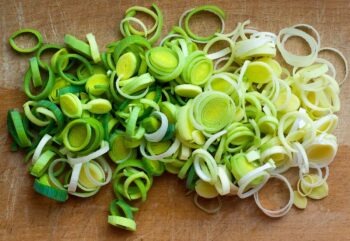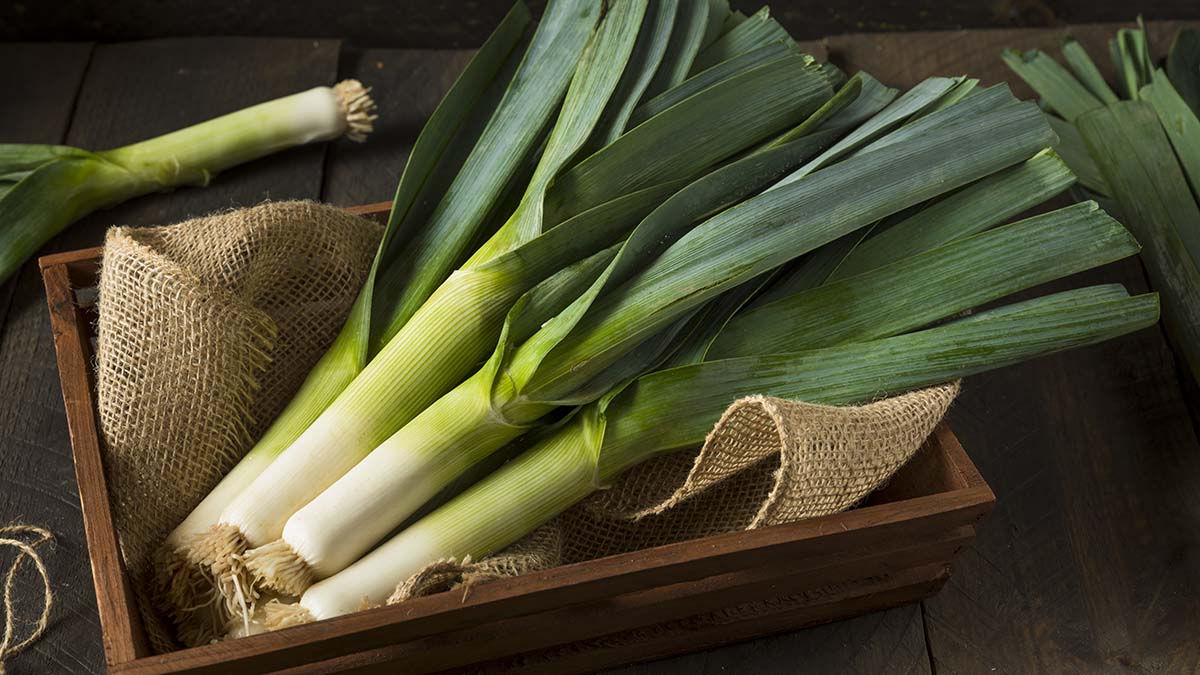[ad_1]
Leek is a vegetable that belongs to the onion and garlic family, however it has a milder and sweeter taste. It is full of benefits, but there is a category of patients who should not consume it – Be informed
*Written by Dimitra Xenaki, Dr. of Structural Food Chemistry
Leeks belong to the same family as onions and garlic. The best period for its consumption is from September to April. Its taste stands out in soups and salads.
The leek belongs to the genus Allium, in the family Alliaceae, and originates from the Middle East. It is low in calories, rich in fiber, a source of antioxidants, a source of vitamins K and B9 as well as a good source of minerals. It is also thought to have a protective effect against certain forms of cancer.
Nutritional value of leeks
For 100 g of cooked leeks:
Energy – 25 calories
Water – 92 gr
Proteins – 1.1 g
Carbohydrates – 3 g
Fats – 0.2 g
Vegetable fiber – 3.2 g
Calcium – 25.6 mg
Iron 0.34 mg
Iodine < 10 mcg
Magnesium 8.45 mg
Phosphorus 20 mg
Potassium 151 mg
Sodium 5.8 mg
Zinc 0.1 mg
B carotene 94 mcg
Vitamin E 0.5 mg
Vitamin K1 25.4 mcg
Vitamin C 1.3 mg
Vitamin B9 or Folic Acid 21.2 mcg

Photo: Shutterstock
RELEVANT ARTICLES
The health benefits of leeks
- Leeks are rich in water and potassium and low in sodium. Therefore it has a diuretic role.
- It contains sulfur compounds and flavonoid antioxidants that allow it to prevent certain cancers.
The main flavonoid is called kaempferol. Flavonoids are antioxidants and may have anti-inflammatory, anti-diabetic and anti-cancer properties, as well as other health benefits. Clear proof of these leek health benefits will depend on future human studies.
The sulfur compounds in leeks are converted to allicin through an enzymatic reaction when the leek stalk is crushed, cut, etc.
Laboratory studies show that allicin contributes to the reduction of cholesterol formation. In addition, it has also been found to have antibacterial, antiviral and antifungal activity. - At the same time, it reduces the stiffness of the blood vessels, helping to reduce the overall blood pressure. It also prevents the formation of blood platelet clots. Therefore, allicin helps reduce the overall risk of coronary heart disease, peripheral vascular disease, and stroke.
- Leeks contain the flavonoids lutein and zeaxanthin, which protect the eyes. These substances, known as carotenoids, reduce the risk of cataracts and age-related macular degeneration
- Leeks are a source of vitamin B6 which plays a role in energy, nervous system, protein synthesis, red blood cell formation and fatigue reduction. It is also a source of vitamin B9, which ensures cell renewal, important for pregnant women for the development of the fetus, and for growing children, as well as for people who are recovering. Their leafy stems contain vital B vitamins.
- Furthermore, leeks are one of the good sources of vitamin A and other flavonoid phenolic antioxidants such as carotenes, xanthine and lutein.
- Leeks are rich in vitamin K, which may reduce the risk of osteoporosis. Some studies show a link between higher vitamin K intake and denser bones, leading to a reduced risk of hip fractures.
Leek stalks contain small amounts of minerals such as potassium, iron, calcium, magnesium, manganese, zinc.
Choice at time of purchase
The stem of the leek should be straight, fleshy, firm, bright white, without brown spots. The leaves should be very green, not wilted, yellowed or dried out.
Save
At near-freezing temperatures and high relative humidity, leeks will keep for two to three months in the refrigerator. Its leaves will probably turn yellow, but the white will remain healthy. On the other hand, small early leeks can only be kept for a week or two in the refrigerator.
To freeze: slice and blanch for a few minutes in boiling water before freezing. Consider freezing some of the leafy greens for broths.
Caution! People on a low-oxalate diet to prevent the recurrence of kidney or urinary stones (urolithiasis) should not consume leeks.
Finally, reported cases of leek allergy are rather rare. However, people allergic to other vegetables in the allium family (garlic, onion, chives) may react when they eat leeks.

Dimitra Xenaki, Dr. of Structural Food Chemistry
